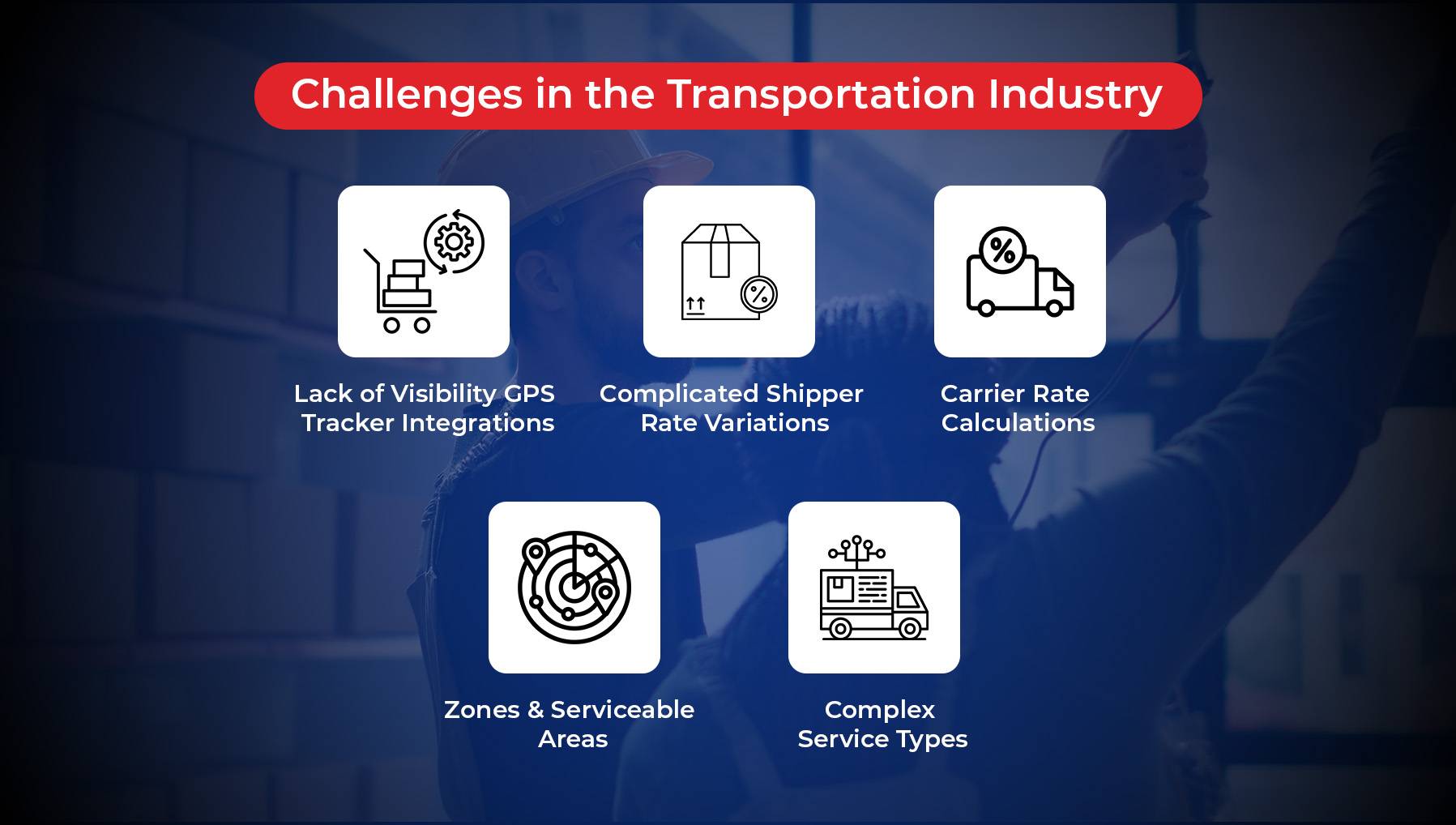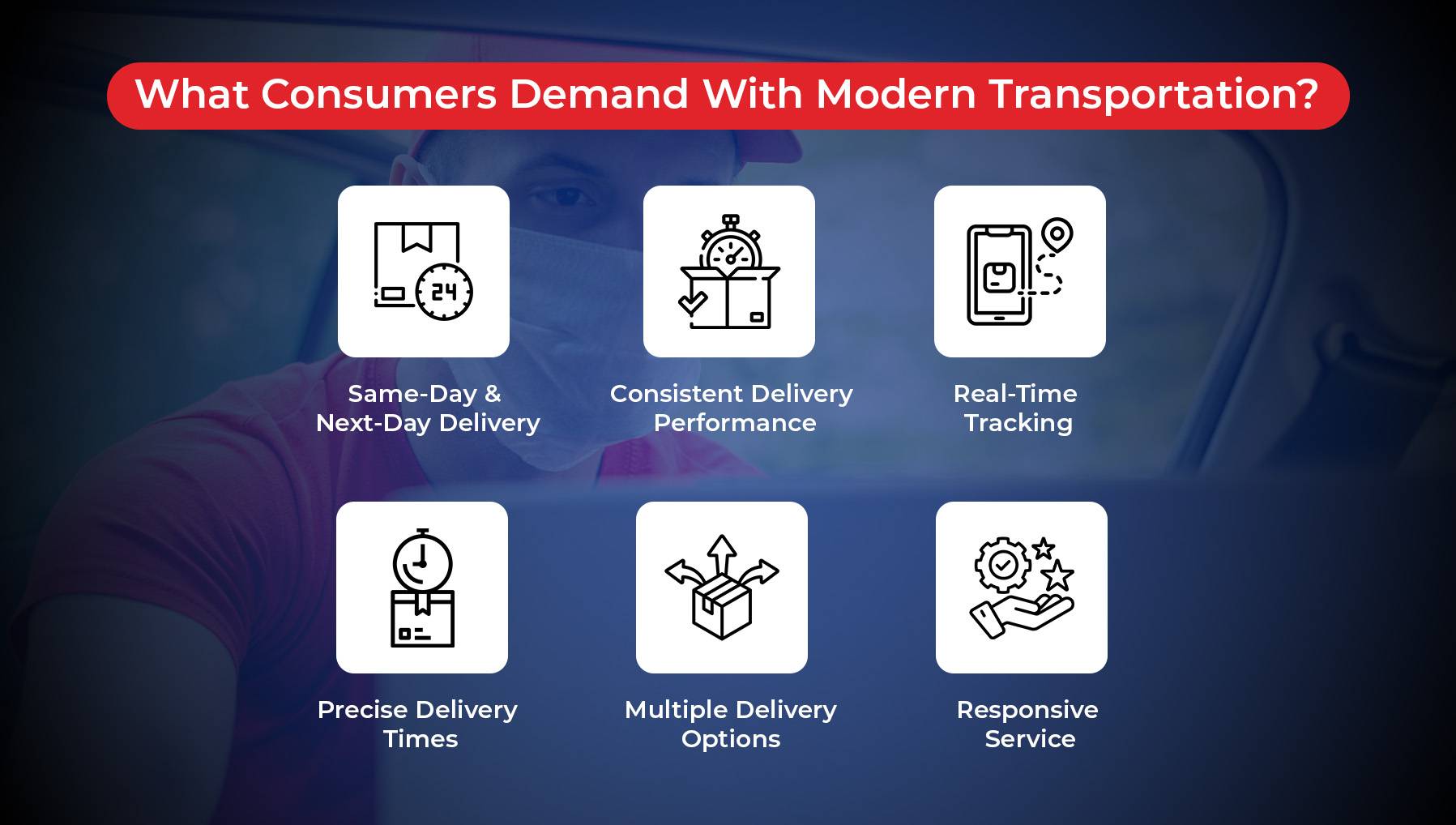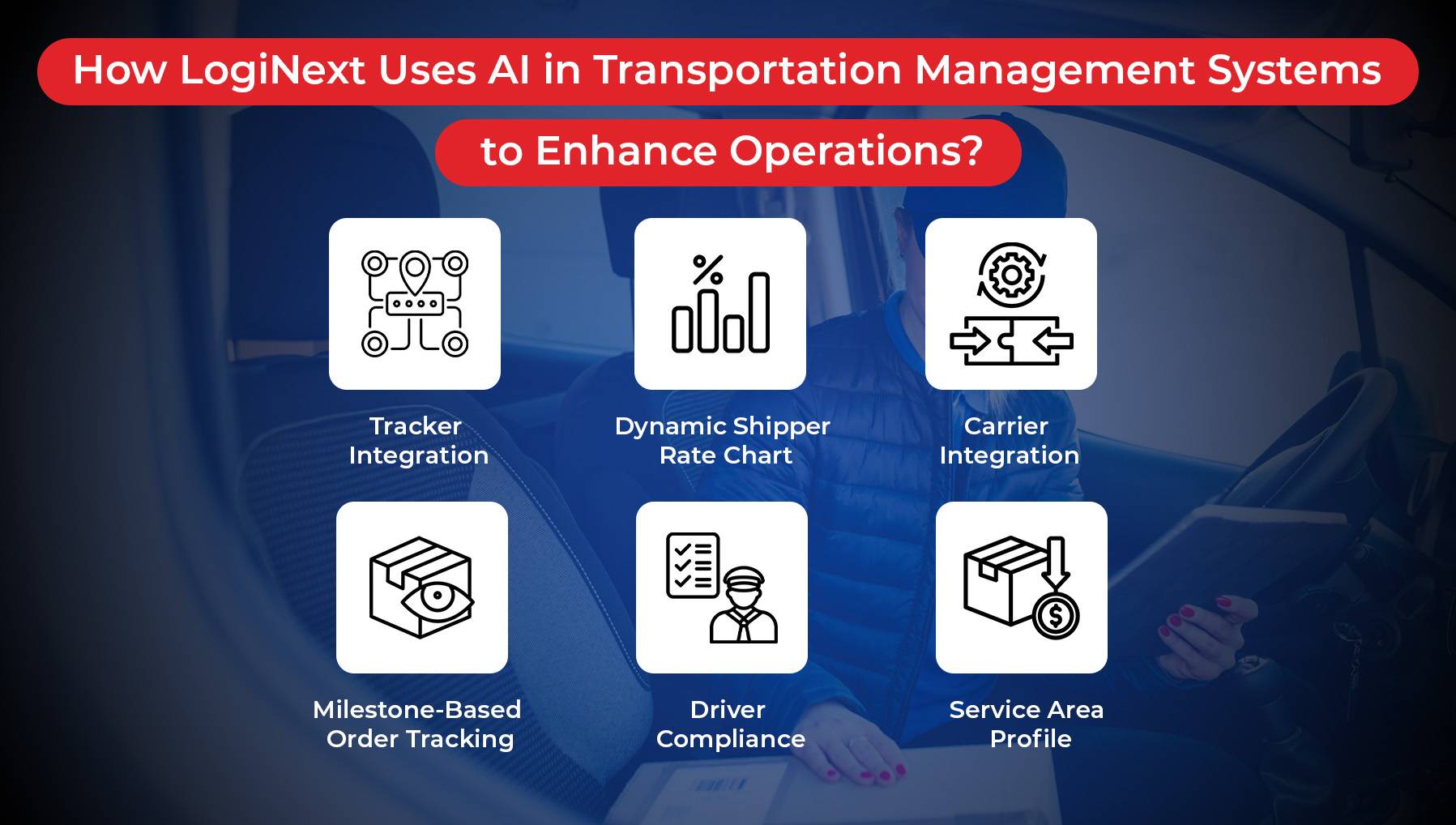
How AI in Transportation Management Systems Ensures Maximum Efficiency
Imagine a world where your packages always arrive on time. Traffic jams are a thing of the past. And delivery routes are optimized for maximum efficiency. This isn’t science fiction, it’s happening now, thanks to AI in transportation management systems (TMS). The global AI market in transportation is expected to reach $10.3 billion by 2030, highlighting its growing impact. But how exactly is AI transforming transportation? Let’s dive in and find out.
Quick Read: Learn How AI in Logistics Automation is Transforming Delivery Operations Globally
Challenges in the Transportation Industry
Despite technological advances, the transportation industry faces several challenges:

Lack of Visibility GPS Tracker Integrations
Many companies struggle with integrating GPS trackers, leading to poor visibility and tracking issues. Without real-time data, managing routes and deliveries becomes a guessing game. GPS integration is crucial for providing accurate location data.
But many systems fail to seamlessly connect, resulting in data lags and inaccuracies. This lack of visibility can lead to missed deliveries, increased operational costs, and dissatisfied customers. According to a survey, 30% of fleet managers cite lack of visibility as a significant challenge.
Complicated Shipper Rate Variations
Shippers often face complex rate variations that can be confusing and hard to manage. Different contracts, fluctuating market rates, and variable pricing structures add to the complexity. For instance, a shipper might have different rates based on volume, destination, or time of year.
Managing these variations manually is time-consuming and prone to errors, leading to disputes and financial losses. A study found that 45% of shippers struggle with managing rate variations effectively.
Carrier Rate Calculations
Calculating carrier rates accurately is another headache. Factors like distance, fuel prices, service type, and even weather conditions affect rates, making precise calculations challenging. Incorrect rate calculations can lead to overcharging or undercharging, affecting profitability and customer satisfaction.
Research reveals that 38% of logistics companies find rate calculations a significant challenge, often leading to financial discrepancies.
Zones & Serviceable Areas
Defining and managing zones and serviceable areas can be tricky. Companies need to ensure they can deliver to all required regions efficiently, but different areas have different requirements. Urban zones may have traffic restrictions, while rural areas might be hard to reach.
Efficiently planning and adjusting these zones is critical to maintaining service levels and reducing delivery times. 28% of logistics providers find managing serviceable areas challenging.
Complex Service Types
Different service types, like express or standard delivery, add another layer of complexity. Balancing these services while maintaining efficiency is a constant challenge. Each service type has its own set of requirements, including speed, handling, and cost considerations.
Managing these varied services efficiently requires advanced planning and real-time adjustments. The Wall Street Journal reports that 42% of transportation companies struggle with balancing multiple service types effectively.
Similar Read: Transforming the Food and Beverage Industry With AI Technology
What Consumers Demand With Modern Transportation Systems?
Today’s consumers have high expectations. They want fast, reliable, and transparent services. Here’s a detailed look at their key demands:

Same-Day and Next-Day Delivery: Consumers increasingly expect same-day or next-day delivery. This expectation is driven by companies like Amazon, which have set high standards for delivery speed. To meet this demand, businesses must have efficient logistics networks and real-time tracking capabilities.
Consistent Delivery Performance: Customers expect their orders to arrive on time, every time. Reliability builds trust and loyalty. Failures in this area can lead to negative reviews and lost customers. Ensuring reliability requires accurate tracking, efficient route planning, and proactive problem-solving.
Real-Time Tracking: Consumers want to know where their packages are at all times. Real-time tracking provides peace of mind and helps manage expectations. Lack of transparency can lead to customer frustration and increased inquiries to customer service.
Precise Delivery Times: Customers appreciate knowing the exact time frame when their delivery will arrive. Providing accurate delivery windows enhances customer satisfaction and reduces missed deliveries. Achieving accuracy requires sophisticated route optimization and real-time data analysis.
Multiple Delivery Options: Consumers want flexible delivery options that fit their schedules. Options like scheduled deliveries, delivery to alternate addresses, and easy rescheduling are highly valued. Flexibility in delivery options requires a responsive and adaptable logistics system.
Responsive Service: In case of issues, consumers expect quick and helpful responses from customer support. Efficient handling of complaints and queries enhances the overall customer experience. Strong customer support systems and effective communication channels are essential to meet this demand.
Learn More: Why are Retail Giants Betting Big on AI in Transportation for Faster Deliveries?
How Does LogiNext Use AI in Transportation Management Systems to Enhance Operations?
LogiNext’s AI-powered Transportation Management System is designed to tackle these challenges head-on. We offer solutions that drive efficiency and customer satisfaction. Here’s how:

Tracker Integration with AI in Transportation Management
LogiNext integrates GPS trackers seamlessly, providing real-time visibility. Companies can monitor their fleets, optimize routes, and ensure timely deliveries. The AI in TMS integration reduces guesswork, enhances operational efficiency, and improves customer satisfaction by providing accurate tracking information.
Dynamic Shipper Rate Chart Enabled by AI in Transportation Management
The AI in transportation Management Systems manages complicated shipper rate variations with ease. It dynamically adjusts rates based on contracts and market conditions, ensuring accurate pricing. This feature eliminates pricing errors, enhances revenue management, and simplifies rate negotiations.
Enhancing Carrier Integration through AI in Transportation Management
Carrier rates are calculated precisely, considering all variables. This AI-based TMS integration helps in negotiating better rates and reducing transportation costs. Accurate carrier rate calculations lead to more competitive pricing and improved profitability.
Milestone-Based Order Tracking in AI-Powered Transportation Management
With milestone-based tracking, customers receive real-time updates on their orders. This transparency builds trust and enhances the customer experience. Milestone-based tracking also helps companies manage exceptions and resolve issues proactively.
Driver Compliance Monitoring via AI in Transportation Management
AI in transportation management systems ensures drivers adhere to compliance standards. It monitors driving behavior, hours of service, and safety regulations, promoting a safer and more efficient workforce. Compliance management reduces the risk of violations, improves driver safety, and enhances overall operational efficiency.
Optimizing Service Area Profiles with AI in Transportation Management
AI in transportation management systems efficiently manages zones and serviceable areas. It ensures all regions are covered, and resources are allocated optimally, enhancing service quality. Efficient zone management reduces delivery times, lowers costs, and ensures consistent service across all areas.
Infographic: 10 Reasons To Consider LogiNext For Transportation and Logistics Operations
Impact of AI on Transportation Management Systems
AI is revolutionizing the transportation industry, making it more efficient and customer-centric. AI-driven solutions such as LogiNext’s Transportation Management System (TMS) are transforming how companies operate. They do by addressing key challenges like visibility, rate calculations, and service complexities.
These systems provide real-time tracking, dynamic pricing adjustments, precise carrier rate calculations, and efficient management of zones and service areas.
For consumers, this means faster, more reliable, and transparent services. They get real-time updates, accurate delivery times, and flexible options, meeting their high expectations and enhancing their overall experience. For companies, it translates into optimized routes, reduced operational costs, improved compliance, and better customer satisfaction.
LogiNext’s AI-powered TMS integrates these advanced features seamlessly, driving both operational excellence and customer delight. It’s not just about keeping up with the competition; it’s about setting new standards in transportation management.
Are you ready to embrace the future of transportation? With AI in transportation management systems, the possibilities are endless. The time is now to transform your logistics operations and stay ahead in a rapidly evolving industry.
Embrace AI and see the difference it can make in ensuring maximum efficiency and customer satisfaction. The future of transportation is bright, and with AI, it’s here today. Click on the red button below to learn more.
133






@LogiNext